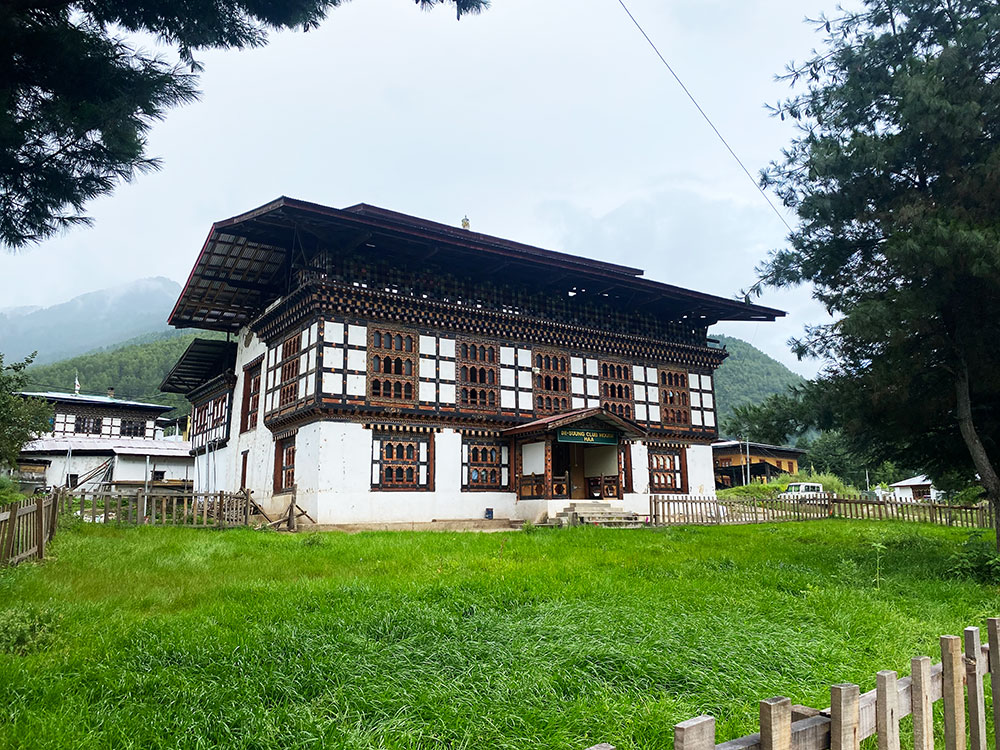Phub Dem | Haa
Many Haa residents want to use the old Namgayling dzong in Haa town, which was used as Haa dzongkhag administration centre for decades, for different purposes.
The Haa Tourism Promotion Association has written to the dzongkhag administration to allow them to use the Namgayling dzong in the heart of the town as a judicial museum and education museum.
Besides serving as Ap Chundu’s (local guardian deity) neyka, the dzong, which is a two-storied traditional house, remained empty after the dzongkhag administration was relocated in 2019.
As of today, the place is occupied as Desuung clubhouse.
During the recent dzongkhag tshogdu (DT), members debated whether to keep the place as the clubhouse or convert it to a Zorig Chusum (13 traditional crafts of Bhutan) training centre.
According to Uesu gup, Nima Tshering, using the old dzong for Zorig Chusum training centre would attract many outsiders to uplift the local economy and enhance the skill development of the locals.
Throm thuemi, Lhap Tshering, said that establishing tourist attraction products had been the local’s priority for a long time.
He said that locals supported the establishment of the Zorig Chusum training centre, considering its impact on school dropouts and unemployed youth. “It will help income generation for the local communities.”
Some DT members said that if the structure has to house the Zorig Chusum training centre, Desuung could relocate their club house to the old Haa court or build new infrastructure.
However, others said that if the Desuung office had plans for establishing a skill development centre, it could serve the same purpose.
According to sources, there was potential to convert the place into Zorig Chusum training centre as Technical and Vocational Education and Training was looking for ready structure to house skill development centres.
DT passed a resolution stating that if the Desuung office has no such provision to establish the place as a skill development centre, the DT office will request the government to convert to a training centre.
Meanwhile, business owners in Haa want to establish infrastructures such as museums, handicraft stalls and Zorig Chusum to improve the local economy.
With the short growing season, income from agricultural production is minimum and there is no other attractive source of income.
A businessman, Rinchen Khandu, said the dzong has potential to attract tourists.
He said that people requested the local leaders to allow utilising the old office as a museum right after the relocation of the administration office. “It is difficult for the locals to voice our concerns as no thromde tshode was held.”
He said that the idea was to convert the two buildings to museum and house the traditional crafts training centres in other surrounding structures. “As for the desuup’s office, there is ample office room space or we could build a new structure for them.”
Rinchen Khandi said the locals wanted to preserve the house as its value is worth more than a ten-storey building.
In May this year, hoteliers, restaurants, and home stay owners of Haa filed a request to the dzongkhag administration to consider establishing tourism attraction products in the old administration office.
The letter stated that developing Haa as a tourist attraction could bring development in Haa, adding that one such best product is converting the old administration block and court building to a museum.
It stated that despite their request, the dzong was given to Desuung, and there was no progress in the development of tourism products.
Haa Tourism Promotion Association proposed turning the old dzongkhag court into National Judicial Museum to preserve the country’s judicial history.
It stated that the museum could serve as an educational and tourist attraction.
Considering the unemployed youths in the dzongkhag, the association also proposed establishing a mini skill development centre in the office rooms of the old office.
Skill development includes activities such as weaving, carving, traditional carpentry, painting.
Edited by Tashi Dema


